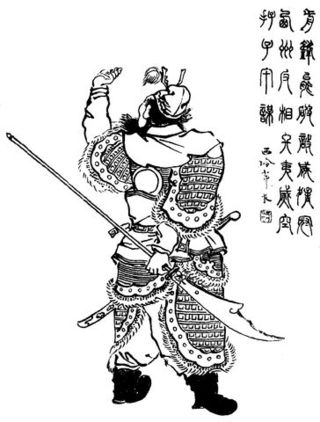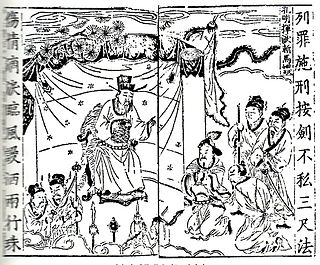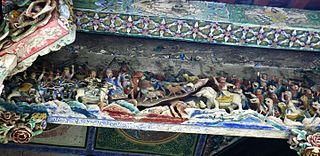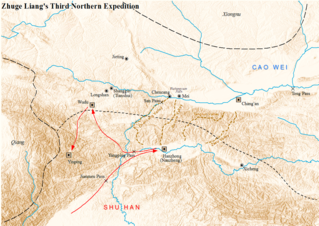
Zhuge Liang, also commonly known by his courtesy name Kong Ming or Kongming, was a Chinese statesman, strategist, and inventor who lived through the end of the Eastern Han dynasty and the early Three Kingdoms period (220–280) of China. During the Three Kingdoms period, he served as the Imperial Chancellor of the state of Shu Han (221–263) from its founding in 221 and later as regent from 223 until his death in September or October 235.

Zhang He, courtesy name Junyi, was a military general serving under the warlord Cao Cao in the late Eastern Han dynasty of China. He continued serving in the state of Cao Wei under its first two rulers, Cao Pi and Cao Rui, during the Three Kingdoms period until his death.

Wei Yan, courtesy name Wenchang, was a Chinese military general and politician of the state of Shu Han during the Three Kingdoms period of China. Originally a subordinate of the warlord Liu Bei in the late Eastern Han dynasty, Wei Yan rose through the ranks and became a general when Liu Bei seized control of Yi Province in 214. His performance in battle helped him to become a prominent figure in the Shu military in a short period of time. He was later appointed as the Administrator of Hanzhong Commandery and as an Area Commander in 219. Between 228 and 234, he participated actively in the Northern Expeditions led by the Shu regent Zhuge Liang against Shu's rival state, Cao Wei. After Zhuge Liang's death in c.September 234, Wei Yan was killed by another Shu general, Ma Dai, for alleged treason.

Cao Ren, courtesy name Zixiao, was a military general serving during the late Eastern Han dynasty of China under the warlord Cao Cao, who was also his older second cousin. He continued serving in the state of Cao Wei – founded by Cao Cao's son and successor, Cao Pi – during the Three Kingdoms period. He played a significant part in assisting Cao Cao in the civil wars leading to the end of the Han dynasty. He was appointed as the Grand Marshal (大司馬) when Cao Pi ascended the throne, and was also credited by the latter for the establishment of Wei. However, Cao Ren was also once derided as a mediocre commander by Zhu Huan, a general from Wei's rival state Eastern Wu.

The Battle of Jieting was fought between the states of Cao Wei and Shu Han in 228 during the Three Kingdoms period in China. The battle was part of the first Northern Expedition led by Shu's chancellor-regent, Zhuge Liang, to attack Wei. The battle concluded with a decisive victory for Wei.

Zhuge Liang's Southern Campaign, also known as the War of Pacification in Nanzhong, was a military campaign which took place in 225 during the early Three Kingdoms period (220–280) of China. It was led by Zhuge Liang, the Imperial Chancellor of the state of Shu Han, against opposing forces in the Nanzhong region. The campaign was a response to rebellions started by local governors in the Nanzhong region and intrusions by the Nanman.

Zhuge Liang's Northern Expeditions were a series of five military campaigns launched by the state of Shu Han against the rival state of Cao Wei from 228 to 234 during the Three Kingdoms period in China. All five expeditions were led by Zhuge Liang, the Imperial Chancellor and regent of Shu. Although they proved unsuccessful and ended up as a stalemate, the expeditions have become some of the best known conflicts of the Three Kingdoms period and one of the few battles during it where each side fought against each other with hundreds of thousands of troops, as opposed to other battles where one side had a huge numerical advantage.

Cao Zhen, courtesy name Zidan, was a military general of the state of Cao Wei during the Three Kingdoms period of China. He was an adopted son of Cao Cao, a warlord who rose to power in the late Eastern Han dynasty and laid the foundation for Wei. After Cao Cao's death and the end of the Eastern Han dynasty, Cao Zhen served under Cao Pi and Cao Rui, the first two emperors of Wei. He is best known for leading a successful defence of Wei from the first two of a series of invasions by Wei's rival state, Shu Han, between 228 and 229.

Wang Ping, courtesy name Zijun, was a military general of the state of Shu Han in the Three Kingdoms period of China. Originally a military officer serving under the warlord Cao Cao. In 219, he defected to Cao Cao's rival Liu Bei during the Hanzhong Campaign. Although he was a talented orator, Wang Ping never learned to read because he joined the army at a young age. However, he did not let this disadvantage stop him and had his clerk help him with his reports. Known for his self discipline, he steadily rose through the ranks to become a senior general. During his career, he defeated Zhang He, quelled Wei Yan's alleged rebellion and was the leading commander of the Shu forces during the Battle of Xingshi. The highest position he reached was Senior General Who Guards the North (鎮北大將軍).
Hao Zhao, courtesy name Bodao, was a military general of the state of Cao Wei during the Three Kingdoms period of China. He is best known for his victory at the siege of Chencang in 229 when he led a successful defence of Chencang against an invasion by a much larger army from Wei's rival state Shu Han. However, he died of illness not long after that.

The Empty Fort Strategy involves using reverse psychology to deceive the enemy into thinking that an empty location is full of traps and ambushes, and therefore induce the enemy to retreat. It is listed as the 32nd of the Thirty-Six Stratagems. Some examples are listed in the following sections.
Chen Shi was a military officer of the state of Shu Han in the Three Kingdoms period of China. He previously served under the warlord Liu Bei in the late Eastern Han dynasty. His name is sometimes recorded as Chen Jie.

Fei Yao was a military general of the state of Cao Wei during the Three Kingdoms period of China.

The siege of Chencang was a battle fought between the states of Shu Han and Cao Wei between December 228 to early 229 during the Three Kingdoms period in China. It was the second of the Northern Expeditions led by Shu-Han's chancellor-regent, Zhuge Liang, to invade Wei. It was part of an attempt to divert Wei forces away from Jing Province following the Battle of Shiting between Wei and Shu's ally state, Eastern Wu. The siege came to an end when Shu forces retreated after failing to capture Chencang.

Three Kingdoms is a 2010 Chinese television series based on the events in the late Eastern Han dynasty and the Three Kingdoms period. The plot is adapted from the 14th century historical novel Romance of the Three Kingdoms and other stories about the Three Kingdoms period. Directed by Gao Xixi, the series had a budget of over 160 million RMB and took five years of pre-production work. Shooting of the series commenced in October 2008, and it was released in China in May 2010.
Zhu Huan (177–238), courtesy name Xiumu, was a military general of the state of Eastern Wu during the Three Kingdoms period of China. Although he started his career early under the warlord Sun Quan, he did not receive any important responsibilities until after the Battle of Jiangling in 209. Since then, Zhu Huan had taken charge of some local defences and successfully quelled a few rebellions. Between 222 and 225, when Cao Pi, the emperor of Wu's rival state Wei, launched a three-pronged invasion of Wu, Sun Quan appointed Zhu Huan as a military commander to resist the Wei invaders. Zhu Huan defeated the Wei general Cao Ren at the Battle of Ruxu (222–223).
The Battle of Ruxu, also known as the Battle of Ruxukou, took place in 222-223 between the forces of Cao Wei and Eastern Wu during the Three Kingdoms period. The battle was the third battle taking place between the Cao and Sun clan at Ruxu, but this particular conflict was the only of the three to take place actually during the Three Kingdoms period, as the other two took place in 213 and 217.

The Battle of Jianwei was fought between the contending states of Shu Han and Cao Wei in the Three Kingdoms period of China. The battle was also the third of a series of military campaigns against Wei launched by Shu's chancellor, Zhuge Liang. The battle concluded with a Shu victory and the capture of Wudu and Yinping commanderies, which were located near present-day Longnan, Gansu.

The Battle of Mount Qi was a military conflict which took place around Mount Qi between the states of Cao Wei and Shu Han in 231 during the Three Kingdoms period of China. It was also the most vigorous of the five Shu invasions of Wei, resulting in thousands of deaths on both sides. Although Zhuge Liang was able to make significant achievement in the beginning of the battle, the battle finally concluded with a strategic Wei victory due to the insufficient food supply for the Shu Han army. The insufficient food supply was caused by heavy rain and mistakes made by Li Yan. The Shu regent, Zhuge Liang, spent three years recuperating before launching another invasion on Wei in 234.















